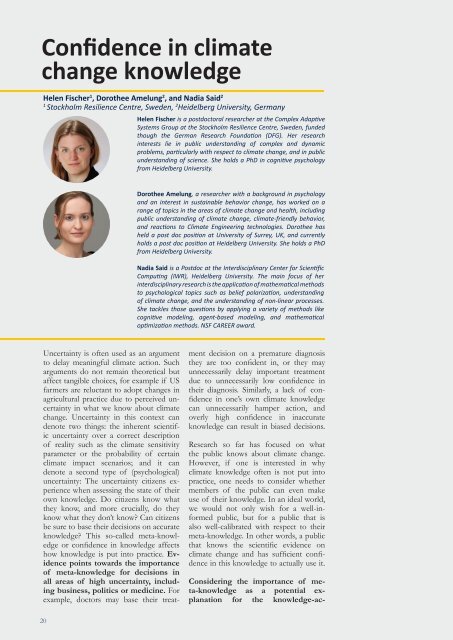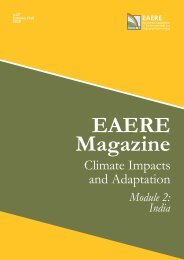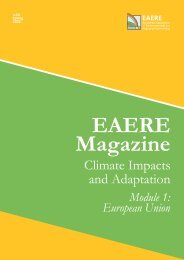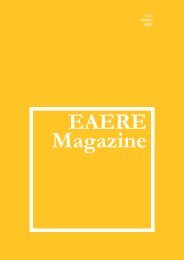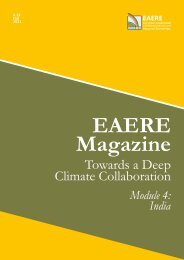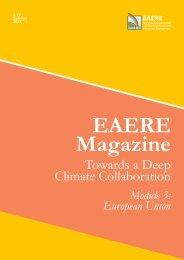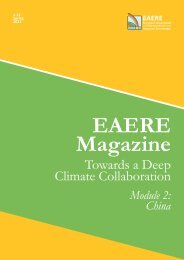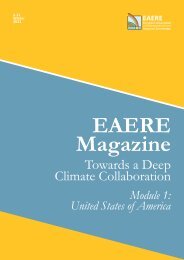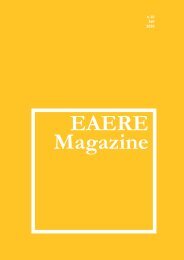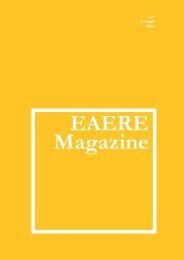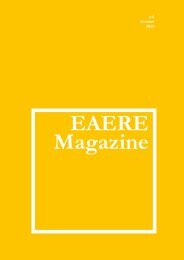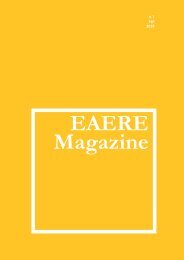EAERE Magazine - n.8 Winter 2020
You also want an ePaper? Increase the reach of your titles
YUMPU automatically turns print PDFs into web optimized ePapers that Google loves.
Confidence in climate<br />
change knowledge<br />
Helen Fischer 1 , Dorothee Amelung 2 , and Nadia Said 2<br />
1<br />
Stockholm Resilience Centre, Sweden, 2 Heidelberg University, Germany<br />
Helen Fischer is a postdoctoral researcher at the Complex Adaptive<br />
Systems Group at the Stockholm Resilience Centre, Sweden, funded<br />
though the German Research Foundation (DFG). Her research<br />
interests lie in public understanding of complex and dynamic<br />
problems, particularly with respect to climate change, and in public<br />
understanding of science. She holds a PhD in cognitive psychology<br />
from Heidelberg University.<br />
Dorothee Amelung, a researcher with a background in psychology<br />
and an interest in sustainable behavior change, has worked on a<br />
range of topics in the areas of climate change and health, including<br />
public understanding of climate change, climate-friendly behavior,<br />
and reactions to Climate Engineering technologies. Dorothee has<br />
held a post doc position at University of Surrey, UK, and currently<br />
holds a post doc position at Heidelberg University. She holds a PhD<br />
from Heidelberg University.<br />
Nadia Said is a Postdoc at the Interdisciplinary Center for Scientific<br />
Computing (IWR), Heidelberg University. The main focus of her<br />
interdisciplinary research is the application of mathematical methods<br />
to psychological topics such as belief polarization, understanding<br />
of climate change, and the understanding of non-linear processes.<br />
She tackles those questions by applying a variety of methods like<br />
cognitive modeling, agent-based modeling, and mathematical<br />
optimization methods. NSF CAREER award.<br />
Uncertainty is often used as an argument<br />
to delay meaningful climate action. Such<br />
arguments do not remain theoretical but<br />
affect tangible choices, for example if US<br />
farmers are reluctant to adopt changes in<br />
agricultural practice due to perceived uncertainty<br />
in what we know about climate<br />
change. Uncertainty in this context can<br />
denote two things: the inherent scientific<br />
uncertainty over a correct description<br />
of reality such as the climate sensitivity<br />
parameter or the probability of certain<br />
climate impact scenarios; and it can<br />
denote a second type of (psychological)<br />
uncertainty: The uncertainty citizens experience<br />
when assessing the state of their<br />
own knowledge. Do citizens know what<br />
they know, and more crucially, do they<br />
know what they don’t know? Can citizens<br />
be sure to base their decisions on accurate<br />
knowledge? This so-called meta-knowledge<br />
or confidence in knowledge affects<br />
how knowledge is put into practice. Evidence<br />
points towards the importance<br />
of meta-knowledge for decisions in<br />
all areas of high uncertainty, including<br />
business, politics or medicine. For<br />
example, doctors may base their treatment<br />
decision on a premature diagnosis<br />
they are too confident in, or they may<br />
unnecessarily delay important treatment<br />
due to unnecessarily low confidence in<br />
their diagnosis. Similarly, a lack of confidence<br />
in one’s own climate knowledge<br />
can unnecessarily hamper action, and<br />
overly high confidence in inaccurate<br />
knowledge can result in biased decisions.<br />
Research so far has focused on what<br />
the public knows about climate change.<br />
However, if one is interested in why<br />
climate knowledge often is not put into<br />
practice, one needs to consider whether<br />
members of the public can even make<br />
use of their knowledge. In an ideal world,<br />
we would not only wish for a well-informed<br />
public, but for a public that is<br />
also well-calibrated with respect to their<br />
meta-knowledge. In other words, a public<br />
that knows the scientific evidence on<br />
climate change and has sufficient confidence<br />
in this knowledge to actually use it.<br />
Considering the importance of meta-knowledge<br />
as a potential explanation<br />
for the knowledge-ac-<br />
20<br />
20


